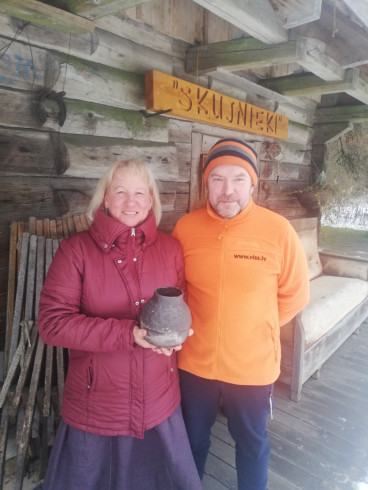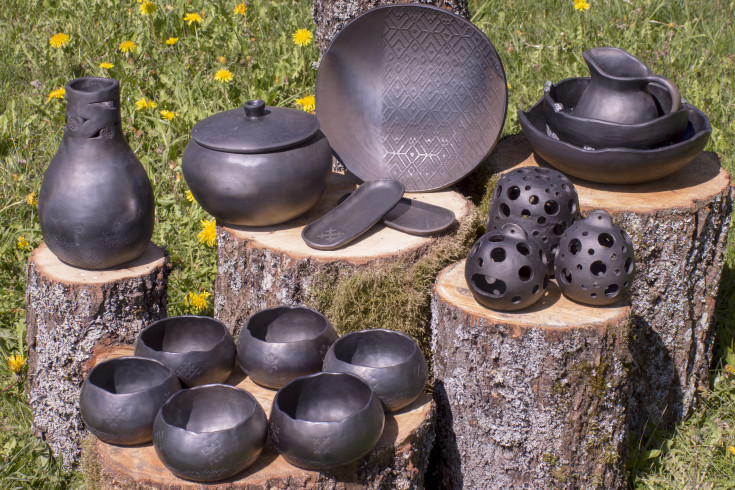During the pandemic lockdowns, many people have learned to bake bread to pass the time and eat healthily. For their part, at their farm “Skujnieki” some 50 km east of Riga, Zanda and Dainis Priednieks practice a craft that nourishes the soul.
Examples of smoked pottery over a thousand years old have been found in Latvia, and people throughout the world engage in it. Because it allows vessels to be formed by hand without a wheel, which are then fired in a wood-burning kiln, even beginners can create stunning items if they take their time. Which many Europeans have plenty of this winter.
“Life is as much fun as you yourself make it, and no one else can do it for you,” says Zanda. “We can’t change the world, but we can make our surroundings more beautiful.”
Smoking good
Zanda and Dainis are true allrounders. She got into handicrafts when her grandma taught her to crochet at age four, started knitting a bit later, then went into teaching. He is a professional chef, an accomplished photographer and the founder of an online shopping portal. Oh, and he also has a degree in philosophy.
About ten years ago, these multitalented folks began attending pottery workshops in Latgale, the Latvian region with the deepest ceramics traditions. They found it a deeply spiritual experience, and over the next few years, Zanda began making plates, bowls and candle holders. Buyers snapped these up at handicrafts markets, and she began teaching friends how to do it, creating a community of smoked potters.
The raw materials can be bought from craft stores. It is shaped by hand, and lightly patted with a wooden spatula to smooth it out, and patterns can be carved into the still malleable mass. Then Zanda polishes the clay with a piece of glass or a smooth stone, giving the pieces a lustrous shine. Then they have to dry for a few days.

Firing the works is a long process, requiring the heat to be very gradually increased until it reaches over 1000 degrees centigrade. In the final stage, the air vents are closed off, and the trapped smoke gives the items their characteristic black finish. Zanda and seven other potters have formed the collective “Madze”, chipping in for the expenses involved in running the Priednieks’ furnace and turning the vigil into a 24-hour party.
Having great people around is the secret to happiness, says Zanda. And so “Skujnieki” has regularly hosted musical weekends where up to 60 friends drop in to sing songs and play instruments. For breakfast, they are treated to an omelette one metre in diameter.
So, something is always cooking... Incidentally, Zanda’s home-baked rye bread with fruit and nuts is outstanding.
Togetherness
For many artisans, 2020 has been the toughest year they can remember. Due to pandemic restrictions, many fairs have been cancelled, including the Christmas events which bring in the bulk of the year’s earnings.
To top things off, the “Madze” group put a lot of energy into preparing an exhibition in the town hall at Ropaži, the town nearest to “Skujnieki”, only to have it closed down the day after it opened by government decree. Undaunted, Zanda is busily making pottery for orders trickling in through her website and Facebook page. There are even overseas customers, trusting in her packing abilities to get the ceramics there in one piece.
The couple are also professional pirtnieki, or sauna masters, who specialise in giving couples a workout in their sauna using steam, birch-leaf whisks and a honey rubdown to finish off.
“We perform sauna rituals because we like happy people,” says Dainis. “I just love the smiles on their faces afterwards.”
This feature was originally published on the website of the Latvian Institute and is reproduced here with permission.































